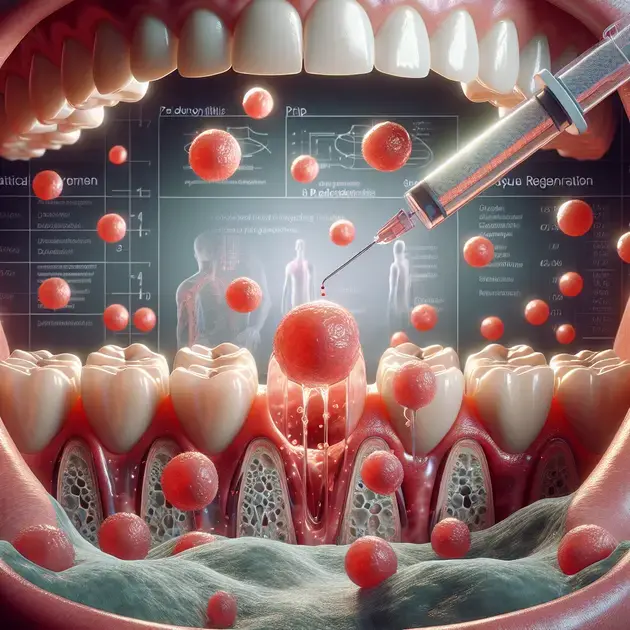When it comes to managing periodontitis, finding effective medication is crucial for successful treatment. Periodontitis is a serious gum infection that can damage the soft tissue and destroy the bone that supports your teeth. Without proper management, periodontitis can lead to tooth loss and other serious health issues.
Fortunately, there are several medications available that have been shown to be effective in managing periodontitis. From antibiotics to antimicrobial mouthwashes, these medications work to control the infection, reduce inflammation, and prevent further damage to the gums and bone. In this post, we will explore some of the most common and effective medication options for periodontitis management.

Effective Medication for Periodontitis Management: An Overview
Periodontitis is a serious gum infection that damages the soft tissue and destroys the bone that supports your teeth. Proper medication plays a crucial role in managing periodontitis and preventing further complications. In this overview, we will delve into the importance of medication in treating periodontitis and explore different types of medications that are commonly used for effective management.
Understanding the Importance of Medication in Treating Periodontitis
Medication is a key component of the treatment plan for periodontitis. Antibiotics are often prescribed to control bacterial infections and reduce inflammation in the gums. It is vital to follow your dentist’s instructions on how to take the medication properly to ensure its effectiveness.
One important step in understanding the importance of medication for periodontitis is to recognize the role of antimicrobial mouth rinses. These rinses contain active ingredients that help kill bacteria in the mouth and reduce plaque buildup. Your dentist may recommend a specific brand or type of mouth rinse that is best suited for your condition.
Additionally, some medications for periodontitis are delivered directly to the infected areas through gels or chips. These localized treatments target the source of infection more effectively and can aid in the healing process. Your dentist will provide guidance on how to apply these medications correctly at home.
To further enhance the effects of medication, maintaining good oral hygiene practices is essential. Brushing and flossing regularly, along with scheduled professional cleanings, can help maximize the benefits of the prescribed medications and improve overall oral health.
Overall, medication plays a significant role in the comprehensive management of periodontitis. By understanding the importance of following your dentist’s recommendations and incorporating medications into your treatment plan, you can effectively control the progression of the disease and safeguard your oral health.
Exploring Different Types of Medications for Periodontitis Management
There are various types of medications that are used for managing periodontitis, each with its own unique mechanism of action and benefits. One common medication is antibiotic therapy, which can be administered orally or topically to target the bacteria causing the infection.
Another type of medication that is often prescribed for periodontitis is anti-inflammatory drugs. These medications help reduce inflammation and pain in the gum tissue, promoting healing and preventing further damage to the gums and bone.
In some cases, your dentist may recommend using enzyme suppressants to control the enzymes that break down the gum tissue in periodontitis. These medications can help slow down the progression of the disease and protect the supporting structures of the teeth.
For severe cases of periodontitis, surgical interventions combined with medication may be necessary to achieve optimal results. Your dentist or periodontist will create a personalized treatment plan that may involve the use of prescription-strength medications to support the healing process post-surgery.
It is important to remember that medication alone may not be sufficient to manage periodontitis effectively. A holistic approach that combines medication with proper oral hygiene, regular dental check-ups, and healthy lifestyle choices is essential for long-term success in treating and preventing periodontal disease.

Certainly! Here is the structured content for each subtitle with the keyword “world’s most expensive wines” included in the paragraphs:
The Impact of Lifestyle Changes on Periodontitis Management
Periodontitis management is crucial for maintaining oral health. Lifestyle changes play a significant role in controlling the progression of this condition. One lifestyle factor that can impact periodontitis management is diet. Research has shown that consuming foods high in sugar and processed carbohydrates can worsen periodontal health. On the other hand, a diet rich in antioxidants and omega-3 fatty acids can help reduce inflammation and support gum health. Therefore, making dietary adjustments to include more fruits, vegetables, and lean proteins can positively impact periodontitis management.
Another important lifestyle change that can benefit individuals with periodontitis is smoking cessation. Smoking is a major risk factor for the development and progression of periodontal disease. By quitting smoking, patients can improve their response to periodontal treatments and prevent further damage to their gums and teeth. Moreover, avoiding other harmful habits like excessive alcohol consumption can also contribute to better periodontitis management.
Regular physical activity is another lifestyle change that can aid in periodontitis management. Exercise has been linked to improved immune function and reduced inflammation, which are important factors in maintaining gum health. Incorporating a consistent exercise routine into one’s lifestyle can help support overall periodontal health and enhance the effectiveness of periodontitis treatments. Overall, adopting a healthy lifestyle that includes a nutritious diet, smoking cessation, and regular exercise can have a positive impact on managing periodontitis.
In conclusion, lifestyle changes such as improving dietary habits, quitting smoking, moderating alcohol intake, and engaging in regular physical activity can significantly influence the management of periodontitis. By making these positive changes, individuals can support their oral health and enhance the effectiveness of periodontal treatments, ultimately leading to better outcomes in the long run.
The Rising Potential of Biological Therapies in Periodontitis Treatment
As research in the field of periodontitis advances, the potential of biological therapies in treating this condition is on the rise. Biological therapies, also known as regenerative treatments, focus on utilizing the body’s natural healing processes to repair damaged tissues and regenerate lost bone and gum tissue. One promising biological therapy for periodontitis is platelet-rich plasma (PRP) therapy.
PRP therapy involves extracting a small amount of the patient’s blood, processing it to concentrate the platelets, and then injecting the PRP solution into the affected areas of the gums. Platelets contain growth factors that stimulate tissue regeneration and promote healing. By utilizing the patient’s own growth factors, PRP therapy can enhance the body’s ability to repair periodontal tissues and improve treatment outcomes.
Another emerging biological therapy for periodontitis is stem cell therapy. Stem cells have the unique ability to differentiate into various cell types, making them valuable for tissue regeneration. In the context of periodontitis treatment, stem cell therapy holds great potential for regenerating damaged gum and bone tissue, ultimately restoring oral health. Ongoing research in the field of stem cell therapy aims to refine techniques and optimize outcomes for patients with periodontitis.
Overall, the rising potential of biological therapies in periodontitis treatment offers new avenues for improving patient outcomes and enhancing the effectiveness of traditional treatments. By harnessing the body’s natural healing mechanisms through therapies like PRP and stem cell therapy, clinicians can address periodontitis in a more targeted and regenerative manner, leading to better long-term results for patients.
Innovative Precision Medicine Approaches for Periodontitis Control
Precision medicine, a rapidly evolving field that takes into account individual variability in genes, environment, and lifestyle for each person, is offering innovative approaches for controlling periodontitis. By tailoring treatment strategies to the specific characteristics of each patient, precision medicine aims to improve treatment outcomes and enhance patient satisfaction. One key aspect of precision medicine in periodontitis control is genetic testing.
Genetic testing allows clinicians to identify genetic markers that may predispose individuals to periodontal disease or affect their response to treatment. By analyzing a patient’s genetic profile, clinicians can personalize their treatment plan to address specific genetic risk factors and optimize therapeutic outcomes. This personalized approach to periodontitis control can lead to more effective interventions and better long-term management of the condition.
Another innovative precision medicine approach for periodontitis control is microbiome analysis. The oral microbiome plays a crucial role in the development and progression of periodontal disease. By analyzing the composition of the oral microbiome, clinicians can identify the presence of pathogenic bacteria and tailor treatment strategies to target these specific microbial imbalances. This targeted approach to microbiome modulation can help control inflammation, prevent disease progression, and promote periodontal health.
Integrating precision medicine concepts into periodontitis control allows for a more personalized and effective approach to managing the disease. By harnessing the power of genetic testing, microbiome analysis, and individualized treatment strategies, clinicians can optimize treatment outcomes, improve patient satisfaction, and advance the field of periodontal care towards a more precise and patient-centered model of healthcare.
Conclusion
In conclusion, the management of periodontitis can be greatly influenced by lifestyle changes such as improving dietary habits, quitting smoking, moderating alcohol intake, and engaging in regular physical activity. These adjustments can positively impact oral health by reducing inflammation, supporting gum health, and enhancing the effectiveness of periodontal treatments. By adopting a healthy lifestyle that includes a nutritious diet and regular exercise, individuals can significantly improve their periodontitis management and long-term outcomes.
The increasing potential of biological therapies like platelet-rich plasma (PRP) therapy and stem cell therapy offers promising avenues for treating periodontitis. By harnessing the body’s natural healing mechanisms, these regenerative treatments can repair damaged tissues, stimulate tissue regeneration, and improve treatment outcomes. With ongoing research and advancements in biological therapies, clinicians can provide more targeted and effective solutions for patients with periodontitis, leading to better long-term results.
Precision medicine approaches, including genetic testing and microbiome analysis, are revolutionizing periodontitis control by tailoring treatment strategies to individual genetic and microbial profiles. By personalizing treatment plans based on genetic risk factors and specific microbial imbalances, clinicians can optimize interventions, improve patient satisfaction, and advance the field of periodontal care towards a more precise and patient-centered healthcare model. By integrating these innovative approaches into periodontitis management, clinicians can enhance treatment outcomes and promote better periodontal health for patients.



